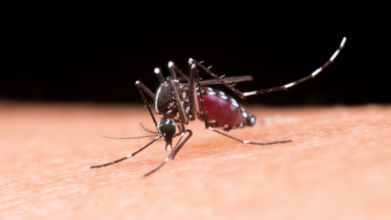- Health Conditions A-Z
- Health & Wellness
- Nutrition
- Fitness
- Health News
- Ayurveda
- Videos
- Medicine A-Z
- Parenting
Why Do Mosquitoes Bite Some People More Than The Others?

Mosquitoes Bite Some People (Credit-Freepik)
Mosquitoes are a big part of the ecosystem, but often are a nuisance as they bite and feed off of us. Their bites cause itchy red bumps and spread infections and allergies in our bodies. But have you ever wondered why they bite certain people more than others? While some people are plagued by mosquito bites, others barely notice them. Here are some interesting facts about mosquitoes that you must know about!
1. Carbon Dioxide:
Mosquitoes are attracted to a certain smell that emits from the human body that is present in the human skin and sweat, mosquitoes can sense the carbon dioxide or CO2 we breathe out. The more active you are, the more CO2 you emit and the more mosquitoes will be attracted to you. Researchers are still investigating the cause of the variation of body odour that brings them to you, possibly genetics or certain bacteria. The unique combination of sweat and skin bacteria creates a scent that mosquitoes find irresistible. Some chemicals in sweat, like lactic acid and ammonia, are especially attractive to them.
2. Colours
While the reason isn't fully understood, mosquitoes seem to be drawn to dark colours like black more than lighter ones. So, ditch the dark outfit next time you're in mosquito territory. It has been noted that mosquitoes are more likely to leave lighter colours alone.
3. Heat and Vapour
Mosquitoes can detect your body's heat and water vapour, acting like a beacon guiding them right to you. So next time you're feeling sweaty, be aware you might be attracting a lot of mosquitoes. If you are working out or doing something that is making you sweat and your body heat rise, the mosquitoes nearby will be instantly attracted to you. Even mosquitoes are careful about who they pick as a host, some studies even suggest that they like a certain body temperature to feed off of.
An interesting fact about mosquitoes is that they can learn to like a host. They have their own preferences and if they meet a certain person who fits their criteria they might be the next host they move onto. In an older study, it showed that 20 per cent of people with mosquito-borne diseases accounted for 80 per cent of diseases transmitted in the population. They suggest that they only bite a certain set of people within the population.
4. Other factors:
Studies suggest mosquitoes might learn to prefer certain people based on things like what you've been drinking. In a 2002 study, there could be many reasons they like alcohol to making your body temperature high etc. Even pregnant women seem to be extra attractive to them due to higher body temperature and CO2 output.
Digital Health and Telemedicine: Expanding Access to Rare Disease Care

(AI Generated)
Rare diseases may be individually uncommon, but together they represent a large and persistent care gap. More than 300 million people globally live with a rare condition, and when families and caregivers are counted, the impact touches over one billion lives. The economic burden is estimated to exceed $7 trillion each year.
In India, the challenge is compounded by geography, uneven specialist availability and the lifelong nature of many rare conditions. The question is no longer whether the system recognises the need, but whether it can deliver continuous care at scale.
Why Patients Still Struggle To Reach Care
For most rare disease patients, the hardest part is not always the science but the pathway to care. Diagnosis is often delayed, sometimes by years. Patients move between providers carrying incomplete records. Specialist centres are concentrated in a few large cities, forcing families to travel repeatedly for consultations that may last only minutes. This is both financially draining and clinically inefficient.
Telemedicine is beginning to ease some of this pressure. Virtual consultations allow specialists to extend their reach beyond metropolitan clusters. For families in tier two and tier three locations, this can mean earlier clinical input and fewer avoidable journeys.
Remote monitoring tools are also shifting care from episodic hospital visits to continuous oversight, which is particularly valuable for conditions that require close tracking over time.
Why Data Matters More Than Ever
If access is the visible challenge, data fragmentation is the structural one. Rare disease information remains scattered across hospitals, laboratories and individual case files. This weak visibility affects everything from prevalence estimates to therapy development. Policymakers struggle to size the problem accurately. Clinicians miss longitudinal patterns. Industry investment becomes harder to justify.
Digital health systems can address this by creating longitudinal patient records that follow individuals across providers. Even relatively modest steps such as strengthening diagnostic reporting or building disease registries can significantly improve coordination. For rare diseases, where patient numbers are small and widely dispersed, structured data is not a luxury. It is the backbone of effective care.
India’s Digital Opportunity
India has begun building the rails needed for this transition. The Ayushman Bharat Digital Mission is creating a national health data architecture anchored in unique health IDs and interoperable records. If applied rigorously to rare diseases, this infrastructure can support lifelong patient tracking, improve referral accuracy and give policymakers clearer visibility into disease burden.
Interoperability will determine how far this effort goes. The growing adoption of FHIR standards and API led systems is slowly allowing previously disconnected hospital platforms to exchange clinical information. For rare disease patients, whose care often spans multiple providers and years of follow up, this continuity is not technical detail. It is essential to safe treatment.
AI Moves From Promise To Practice
Artificial intelligence is also starting to show practical value. Globally, AI based clinical decision support tools are being used to flag potential rare disease cases hidden within routine health records. This matters because many rare conditions present with non specific symptoms and are frequently missed in early stages.
Collaborations between technology firms and pharmaceutical companies are demonstrating how electronic health record analysis, suspect patient lists and longitudinal data can help clinicians triage cases earlier for confirmatory testing. As these tools mature and integrate into routine workflows, they could significantly shorten the diagnostic odyssey that rare disease families currently endure.
Engaging Patients Beyond The Clinic
At the patient level, the shift is becoming more practical and visible. Tools that let people log symptoms, get medication reminders and share updates in real time are helping them stay more consistent with treatment, while giving clinicians better insight between visits. For lifelong conditions, this kind of day to day support brings care into the flow of everyday life, where most disease management actually happens.
Federated data models add an important layer of trust. By enabling analysis across multiple small patient populations without moving sensitive personal data, they address both privacy concerns and the sample size limitations that have historically slowed rare disease research.
From Pilots to Systems
Progress is visible across both public and private sectors. Regulated digital health platforms are already supporting rare disease programmes in several countries. Industry collaborations are using AI to detect conditions that often go undiagnosed for years. Public genomic databases are generating new diagnoses by enabling experts to build on shared evidence.
India’s immediate task is to move beyond isolated pilots. Telemedicine networks must be tied to referral protocols and reimbursement pathways. Digital registries must be built with strong governance and patient trust. AI tools need to be embedded into everyday clinical workflows rather than remaining demonstration projects.
Why Investment Makes Fiscal Sense
Poorly managed rare diseases create avoidable hospitalisations, lost productivity and long term care costs. Evidence increasingly shows that targeted investments in data systems, screening and coordinated care can reduce downstream expenditure. For low- and middle-income countries working within tight health budgets, these are not marginal gains.
India already has many of the building blocks needed to improve rare disease care, from expanding digital health infrastructure to growing AI capabilities and increasing policy focus. The real test now is disciplined execution.
Telemedicine networks must deepen their reach, patient registries need to become reliable and usable, data must move securely across systems, and clinicians should have decision support tools that fit into everyday practice. Taken together, these steps can meaningfully narrow today’s access gaps.
Digital health will not make rare diseases any less complex. But if implemented thoughtfully, it can reduce distance, shorten delays and bring much needed continuity to care journeys that are currently fragmented. For families managing lifelong conditions, that would be a tangible and much overdue shift.
When Symptoms Don’t Add Up: How Hidden Genetic Conditions Go Undetected for Years

(AI Generated)
In India, it is not uncommon for families to travel across cities, sometimes across states, seeking answers for symptoms that simply don’t make sense. A child who is not meeting developmental milestones. A young adult with unexplained muscle weakness. Recurrent hospital visits with no clear diagnosis.
For many, this long and frustrating search for clarity is what medicine calls the diagnostic odyssey.
Rare diseases are individually uncommon, but collectively they affect millions of people worldwide. Rare diseases affect an estimated 263–446 million people worldwide, spanning every geography, healthcare system, and socioeconomic context. India alone is estimated to have 70 million people living with rare diseases.
Importantly, although 70%–80% of rare diseases are genetic in origin, routine medical practices often consider genetic testing only after years of inconclusive evaluations.
In India, this challenge is amplified by several factors, including limited awareness of rare conditions, uneven access to specialized testing across regions, and a tendency to treat symptoms individually rather than look for a unifying cause.
A child may see a neurologist for seizures, a gastroenterologist for feeding issues, and a developmental pediatrician for delays, without anyone connecting the dots.
Studies have shown that patients and their families frequently wait years before receiving a confirmed diagnosis. Globally, rare disease diagnosis can take anywhere between 5–30 years.
In a country like India, where healthcare expenses are often paid out-of-pocket, this prolonged uncertainty can be devastating. Beyond cost, there is the psychological toll; parents wondering if they missed something and adult patients often questioning whether their symptoms are “all in their head”. During this period, families undergo repeated tests, face conflicting opinions, and bear significant emotional and financial strains.
Research shows that families experience profound emotional burden during the diagnostic odyssey, including stress, anxiety, and feelings of isolation.
Why Do These Conditions Stay Undetected For Years?
In many cases, the explanation is written into a person’s DNA. Genetic disorders rarely announce themselves clearly; instead, they often mimic common illnesses. Fatigue may look like anemia, developmental delay may resemble a learning difficulty, and repeated infections might be treated as isolated events rather than part of a larger pattern. Because the symptoms overlap with more familiar conditions, doctors naturally begin by treating what appears most likely.
Most healthcare systems also follow a step-by-step diagnostic approach; rule out the common causes first, then move to less common ones if symptoms persist. While this method works well for typical illnesses, it can significantly delay answers for rare genetic conditions. Without looking directly at the genetic blueprint, the underlying cause may remain hidden, even as the visible symptoms are managed one at a time.
Today, advances in genomic technologies such as whole-exome sequencing (WES) and whole-genome sequencing (WGS) allow us to examine thousands of genes simultaneously. Rather than guessing which gene might be responsible, we can comprehensively analyze a patient’s DNA to search for answers.
Evidence increasingly supports the use of genomic sequencing earlier in the diagnosis and care of rare diseases. Similarly, studies highlight how genomic testing not only provides diagnoses but also directly influences treatment decisions and long-term care planning.
In the Indian context, integrating genetic testing earlier could transform care. Instead of years of fragmented consultations, patients could receive a precise diagnosis sooner. This clarity can:
- Prevent unnecessary or repeated investigations
- Guide appropriate treatment strategies
- Inform family members about potential risks
- Enable informed decisions about future pregnancies
- Equally important, it replaces uncertainty with understanding.
Encouragingly, awareness around rare diseases is growing in India, and conversations around early genomic testing are becoming more mainstream. As technology becomes more affordable and accessible, we have an opportunity to fundamentally change the patient journey.
No family should spend years searching for answers when science has the tools to help. By embracing genomic medicine earlier in the diagnostic pathway, we can shorten the odyssey, reduce suffering, and empower families with clarity.
Because when symptoms don’t add up, sometimes the answer lies written in our genes.
Bill Clinton’s Trembling Hand Sparks Parkinson’s Disease Health Concern

Former US president Bill Clinton’s recent public appearance has sparked inquires of Parkinson’s disease in the media. The video was made public by the GOP-led House Oversight Committee, and it showed Clinton alongside his legal team giving his testimony concerning his past associations with the late convicted sex offender Jeffery Epstein.
Social media users quickly pointed out that during the video, the former president’s hand visibly trembled as he raised his glass of water. Hand tremors are often associated with cognitive decline, as it is known as an early sign of Parkinson’s.
The footage, captured at his home in Chappaqua, New York, showed a specific moment where Clinton’s hands shook as Representative Nancy Mace questioned him.
Are Hand Tremors A Sign Of Parkinson’s?
According to Parkinson’s Foundation, for many, a tremor (shaking) is the first sign of Parkinson’s. The most common type is a "resting tremor." This means your hand or leg might shake while you are sitting still or walking, but the shaking usually stops or gets better when you actually use that body part like reaching out to grab a glass of water.
Most people with Parkinson’s (70% to 90%) will have a tremor at some point. Interestingly, patients who have a resting tremor often see their symptoms progress more slowly than those who don't.

Could Hand Tremors Indicate Other Issues?
WashU Medicine explains that essential tremor is the most common reason for shaky hands, but it’s different from Parkinson’s. With essential tremors, your hands shake while you are using them, like holding a deck of cards. Parkinson’s usually causes shaking only when hands are resting. So what are some factors that can cause hand tremors?
Lifestyle and Stress
Almost everyone has a tiny, invisible tremor. However, things like high stress, being very tired, or feeling angry can make that shake visible. Drinking too much caffeine or smoking cigarettes can also cause your hands to tremble temporarily until the stimulants leave.
Age
While anyone can develop a tremor, it is most common in people over age 65. This type of shaking is usually "benign," meaning it isn't dangerous. It mostly affects the hands, head, or voice, and rarely spreads to the legs or feet.
Medication Side Effects and Withdrawal
Sometimes, the medicine you take for other things is the culprit. Drugs for asthma, seizures, or depression can cause shakiness. Shaking can also happen if you are going through alcohol withdrawal or using tobacco, as these substances directly affect your nervous system.
Potential Underlying Health Conditions
Hand tremors can sometimes be a "warning light" for other health issues. Problems like an overactive thyroid, or rare conditions where copper builds up in the body, can cause shaking. A doctor can run simple tests to see if these are the cause.
Clinton’s History with "Aging Tremors"
While the footage may appear concerning to new viewers, these tremors are a documented part of Clinton's health history. As far back as 2013, the 42nd President addressed similar concerns, clarifying that he had undergone medical testing to rule out Parkinson’s.
At the time, Clinton explained that his doctors attributed the shaking to a "normal aging phenomenon." He noted that while he was initially concerned enough to seek a professional diagnosis, he felt relieved to learn the tremors were not related to a progressive disease.
© 2024 Bennett, Coleman & Company Limited

